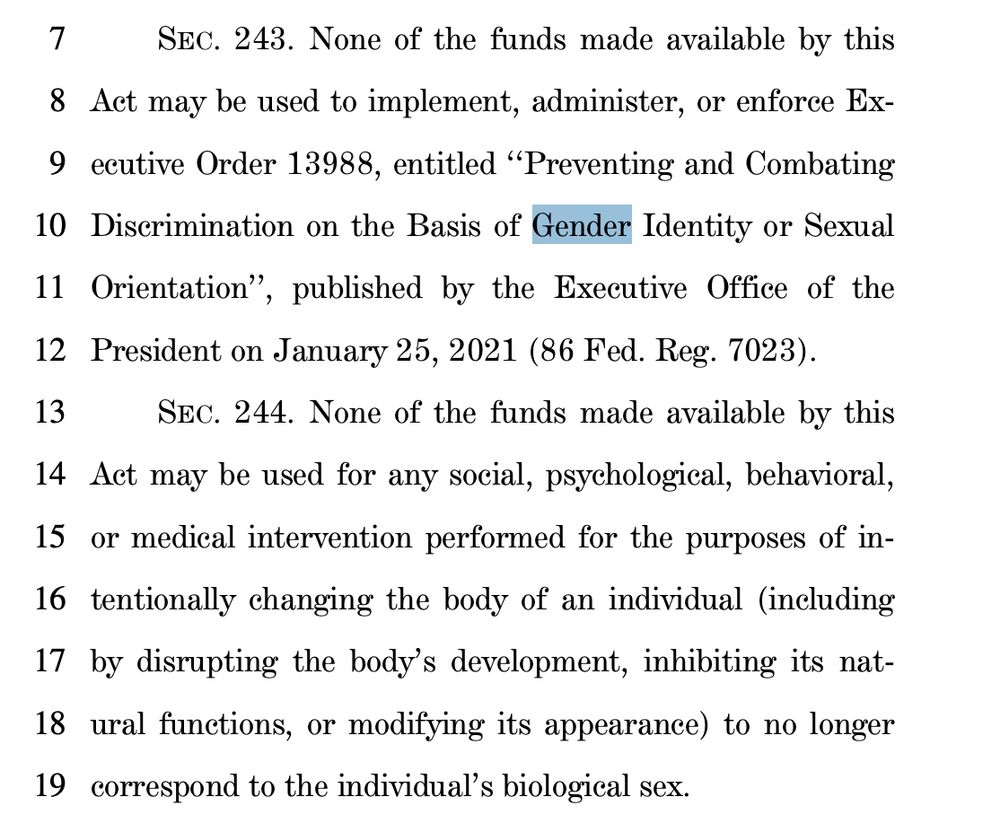New HHS Bill Sparks Outrage With Plan to Cut All Federal Funding for Gender-Affirming Care


Table of Contents
ToggleThe recent HHS appropriations bill proposes significant cuts to federal funding for gender-affirming care, raising concerns about its implications for Medicaid and Medicare beneficiaries. This move could exacerbate existing mental health challenges and restrict access to vital treatments. Furthermore, the bill includes provisions that threaten transgender rights, particularly in educational settings. As the legislative process unfolds, the urgency for advocacy against these measures becomes increasingly critical. What might this mean for the future of transgender rights and health care?

As lawmakers propose the new HHS appropriations bill, they introduce provisions that could greatly impact access to gender-affirming care across all generations. These provisions bar federal funding for any interventions that alter an individual’s body to no longer align with their biological sex. This sweeping measure affects not only medical treatments but also social, psychological, and behavioral interventions, creating a potential gap in care for adults relying on Medicaid and Medicare. The language used allows for broad interpretation, likely restricting access to vital psychological support and counseling services. Furthermore, the threat of funding cuts may pressure hospitals and clinics to comply, effectively limiting the availability of gender-affirming care nationwide.

The restrictions set forth in the new HHS appropriations bill pose significant consequences for beneficiaries of Medicaid and Medicare who rely on gender-affirming care. If enacted, the Medicaid impact could be immediate, cutting access to vital medical, psychological, and social support services. Many beneficiaries may find themselves unable to afford necessary treatments, leading to adverse health effects and increased mental health crises. Furthermore, the Medicare consequences could extend beyond individual patients, potentially disrupting the operations of healthcare facilities that serve transgender individuals. With the bill’s vague language, even routine administrative updates might be deemed non-compliant, making it increasingly difficult for you to navigate the healthcare system. Ultimately, this legislation could exacerbate existing health disparities among vulnerable populations.

Historically, attempts to restrict funding for gender-affirming care have surfaced in multiple legislative efforts, reflecting a persistent trend towards limiting access to vital medical services for transgender individuals. Previous historical bans aimed at Medicaid and Medicare funding targeted both youth and adults, indicating a broad strategy to eliminate financial support for necessary care. For instance, earlier efforts included provisions in significant bills that were ultimately struck down, highlighting the contentious nature of this issue. The funding implications of these restrictions have been severe, leading to the closure of numerous gender clinics nationwide. Such legislative actions not only threaten individual care but also underscore a growing movement to undermine transgender rights across the healthcare system.
Legislative efforts to restrict funding for gender-affirming care aren’t just limited to healthcare; they also extend into educational and athletic domains, targeting the rights of transgender individuals in sports. The bill proposes stripping federal funding from educational institutions that allow transgender female students to participate in women’s sports, effectively establishing a national transgender sports ban. This vague language concerning “activities” raises concerns about broader implications, potentially impacting access to bathrooms, dormitories, and gender-specific programs. These sports regulations seem designed to undermine transgender rights, creating an environment that discourages inclusive participation. In this way, the bill threatens not only healthcare access but also the fundamental rights of transgender individuals in educational and athletic contexts.
As the deadline for government funding looms closer, the urgency for advocacy becomes increasingly critical. You must engage in effective advocacy strategies to influence the legislative process surrounding the HHS bill. Here are three steps to evaluate:
With legislative urgency at play, your voice can help shape the outcome. Every effort counts as we navigate the complexities of this critical issue.
To oppose funding cuts to gender-affirming care, you should engage in grassroots mobilization and raise public awareness. Start by organizing local events to educate your community about the implications of these cuts. Utilize social media to amplify your message and connect with advocacy groups. Contact your elected representatives, expressing your concerns clearly and urging them to oppose these measures. Building a coalition with diverse allies can strengthen your efforts and improve visibility.
Organizations like the Human Rights Campaign, Lambda Legal, and the American Civil Liberties Union are leading the fight against these provisions. They focus on LGBTQ advocacy and healthcare equity, mobilizing resources to challenge discriminatory policies. By raising awareness and providing legal support, these groups endeavor to protect access to gender-affirming care. Engaging with lawmakers and the public, they emphasize the importance of equitable health services for all individuals, regardless of gender identity.
This bill could greatly harm mental health services for transgender individuals. By cutting federal funding, you might see a reduction in access to crucial transgender support, such as counseling and psychological care. The mental health impacts could be severe, leading to increased rates of anxiety and depression among those who rely on these services. Without adequate funding, providers may struggle to offer required support, ultimately jeopardizing the well-being of transgender individuals in need.
Yes, you can anticipate legal challenges against this bill. Legal implications include potential lawsuits focused on discrimination and violations of established healthcare rights. Advocates may argue that cutting federal funding for gender-affirming care infringes on constitutional protections and could disproportionately harm vulnerable populations. The broad language in the bill may also lead to legal scrutiny, as it could be interpreted to affect crucial mental health services, prompting further litigation.
If you’re seeking support, diverse community resources and support networks are available. Look for local LGBTQ+ organizations that offer counseling and advocacy services. Online platforms, like forums and social media groups, can connect you with others facing similar challenges. National organizations, such as the Trevor Project or PFLAG, provide valuable information and helplines. Engaging with these networks can empower you and help navigate your situation effectively.
Considering the proposed cuts to federal funding for gender-affirming care, it’s vital to recognize the potential repercussions on vulnerable populations, particularly Medicaid and Medicare beneficiaries. The historical context of such funding restrictions reveals a pattern of targeting transgender rights, which further exacerbates existing inequalities. As the legislative process unfolds, active advocacy is fundamental to counter these harmful provisions, ensuring that access to necessary healthcare and support services remains intact for those who need it most.
 Featured PostsNovember 30, 2025A Lifetime of Longing: Tracking the Progression of Gender Dysphoria
Featured PostsNovember 30, 2025A Lifetime of Longing: Tracking the Progression of Gender Dysphoria Featured PostsNovember 28, 2025Healing From Facial Feminization Surgery
Featured PostsNovember 28, 2025Healing From Facial Feminization Surgery Featured PostsNovember 28, 2025Decoding Your Identity: Subtle Clues You May Be a Trans Woman
Featured PostsNovember 28, 2025Decoding Your Identity: Subtle Clues You May Be a Trans Woman Activism and ChangeNovember 24, 2025Love, Equality, and Justice: Why We Need Pride Parades Today
Activism and ChangeNovember 24, 2025Love, Equality, and Justice: Why We Need Pride Parades Today